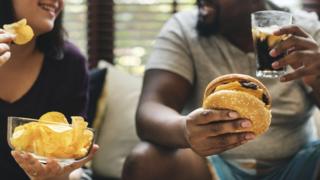
 Image copyright
Image copyright
Getty Images
The prime minister is set to announce new measures to curb obesity next week, and they are expected to include a ban on TV junk food adverts before 21:00.
The measures are yet to be finalised but are also likely to include a ban on online ads for unhealthy foods and limits on in-store promotions.
Some restaurants could be required to put calorie labels on menus.
It comes amid growing evidence people who are overweight or obese are at greater risk from coronavirus.
The move marks a change in stance by Prime Minister Boris Johnson, who has previously criticised levies on foods high in salt, fat and sugar – and described his views on tackling obesity as “libertarian”.
Mr Johnson’s experience in intensive care during his treatment for Covid-19 is thought to have contributed to his changing position.
- Has coronavirus exposed our underlying ill health?
- Does being overweight or obese affect how ill people get with coronavirus?
Boris Johnson has long been critical of the “nanny state”.
But the apparent link between obesity and more serious cases of Covid-19, along with his own experience in intensive care, appears to have convinced the prime minister that the government should take a more active role in promoting public health.
He has described the coronavirus crisis as “a devastating blow” so it seems that the obesity strategy will be part of a battle plan to prevent it striking so hard again.
Ministers are still finalising the detail of some anti-obesity measures, such as whether to require more prominent labelling of food and drinks with high levels of sugar or salt.
Proposals put forward, but not enacted, by Mr Johnson’s predecessor Theresa May in 2018 are likely to be revived.
She consulted on whether to ban TV adverts for foods that are high in fat, salt or sugar during family viewing hours – and whether to restrict online advertising.
The proposals were widely resisted by advertisers and commercial broadcasters.
But it is thought Mr Johnson is likely to push ahead with advertising restrictions, and is considering banning in-store promotions of unhealthy foods.
Health and Social Care Minister Helen Whatley told BBC Breakfast that while she could not comment on the reports, an announcement was due “imminently”. She said she recognised obesity was “possibly the greatest health challenge” the country faced.
“Particularly with Covid, you are at greater risk of getting it, at greater risk of complications, at greater risk of sadly dying from Covid if you are overweight.
“As it is such an important health challenge we have to take it on, and the PM is committed to making sure we tackle obesity and… people live healthy lives.”
Tam Fry, chairman of the National Obesity Forum, told BBC Radio 4’s Today programme he believed the prime minister’s experience in St Thomas’s hospital had been a “game changer” and that it was understood the aim was to get people to lose weight “prior to the next spike”.
He said: “There hasn’t been a ban like this but it has got to be given a try – and if after a period of time it is shown not to be so effective, then maybe it will stop.
“It is indeed a risk but the problem is that the consequence of obesity is so great that risks and daring measures have to be put in place.”
He called for the sugar tax on soft drinks to be extended to other products.
The NHS says most adults with a body mass index (BMI) of 25 to 29.9 are overweight, while those with a BMI of 30 to 39.9 are classed as obese. Another measure of excess fat is waist size – with men with a waist of 94cm or more and women with a waist of 80cm or more, likely to develop obesity-related problems.


